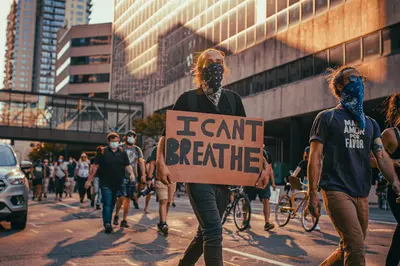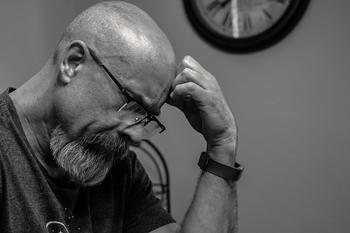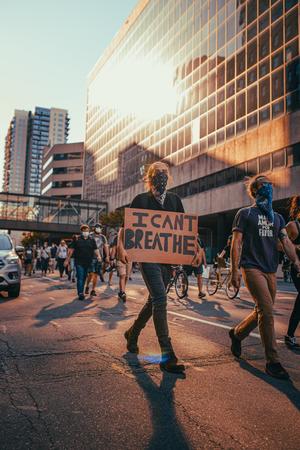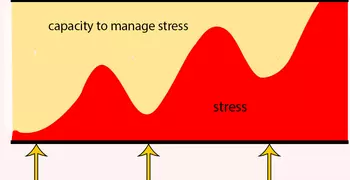Mindfulness for Racial Justice

Note: This article arose from a conversation with Rhonda Magee, a law professor and mindfulness teacher and the author of The Inner Work of Racial Justice: Healing Ourselves and Transforming Our Communities through Mindfulness. Magee writes about the importance of mindfulness for people working toward racial justice. We encourage all readers to check out Magee's writings to see how her work resonates for you.

Many people are just now waking up to the reality of racial inequity in America - a reality that has long been the lived experience of Black, Indigenous, and People of Color (BIPOC). While people may feel moved to do something, we may also feel helpless: How can we help fix a systemic problem that is so complex and pervasive?
Law professor, mindfulness teacher, and social justice advocate Rhonda Magee believes that we start by cultivating mindfulness, what she calls “The Inner Work of Racial Justice.” In an interview with Taking Charge, Professor Magee discussed the systemic inequalities that have contributed to deep societal unrest and explained how developing a strong mindfulness practice can help us do the inner work we need to make changes that will impact not just ourselves, but the collective society.
What is systemic racism?
A large system of inequity permeates our society that many people do not understand. “In reality, power structures distribute resources in favor of some groups of people over others – such as white over Black,” says Magee. “Education, healthcare, criminal justice, immigration resources are all examples of systems that highlight racial inequity.” These systems also contribute to the development of personal biases, which appear in even the most compassionate and well-intentioned people.
How mindfulness can help address racial injustice
Begin a mindfulness practice“Mindfulness deepens our ability to notice very subtle aspects of our lived experience and to be present with those aspects,” Magee says. “It also provides an ethical lens to help us understand how the ways we engage impact our interpersonal relationships and actions in the world.”
Mindfulness practice can bring about transformation on three levels: personal, interpersonal, and collective. We must first clearly see our own biases in action, and how they harm others, and then work with compassion to bring justice into the world.
Personal transformation
Staying present to the reality of what is happening can be painful work, especially to see that while we have always identified as a “good person,” we still participate in and benefit from a culture of inequity. But mindfulness calls us to simply observe without getting caught up in a storm of judgment and self-hatred - at least to do so long enough to better understand it. “We’re all works in progress,” Magee says. “We’re all just informed by the environments and experiences that we’ve had.”
Mindfulness can help us remain compassionate to ourselves as we learn to leave our hearts open to what we see, no matter how much it may challenge our view of ourselves. And it can assist us in deepening our resolve to change our actions and behavior in the future.
Working with shame
 It can be painful to uncover the ways that our own actions, or our silence, harm others. Shame is a natural response to this recognition. It can help clarify what behaviors we would like to change going forward. But rather than turn away from shame by dropping our mindfulness practice or ignoring what we have seen, mindfulness invites us to continue being curious about everything that arises – even shame itself. You can ask yourself, “Is this attitude of shame helpful or harmful? Does it make me a more loving person, a person committed to taking inclusive action? Or is it standing in the way of my ability to make positive change?” Having a sense of self-compassion is important - it will give you the courage to maintain your practice when what you’re looking at is difficult to see.
It can be painful to uncover the ways that our own actions, or our silence, harm others. Shame is a natural response to this recognition. It can help clarify what behaviors we would like to change going forward. But rather than turn away from shame by dropping our mindfulness practice or ignoring what we have seen, mindfulness invites us to continue being curious about everything that arises – even shame itself. You can ask yourself, “Is this attitude of shame helpful or harmful? Does it make me a more loving person, a person committed to taking inclusive action? Or is it standing in the way of my ability to make positive change?” Having a sense of self-compassion is important - it will give you the courage to maintain your practice when what you’re looking at is difficult to see.
In her book, The Inner Work of Racial Justice: Healing Ourselves and Transforming our Communities Through Mindfulness, Magee writes, “Being able to feel all of our feelings, and being able to name them without shame or disapproval, are crucial steps along the path - from seeing what is there, to accepting the reality of it in a way that enables us to acknowledge it more fully.”
This willingness to investigate, rather than shutting down, can help you stay open to the inevitable pain of transformation.
“Being able to feel all of our feelings, and being able to name them without shame or disapproval, are crucial steps along the path."

Try This
Magee emphasizes the importance of grounding within your physical experience as a way of connecting to the present moment. When you see a news story about police brutality against a person of color, or find yourself in a conversation among coworkers about race, pay attention to your moment-to-moment experience.
- Do you tense up?
- What does it feel like in your body?
- Do you change the channel or shift topics?
- What do you assume you know about the issue?
- Do you become defensive?
Don’t judge your experience; the practice is to simply become familiar with what is happening within you.
Remember to be compassionate to yourself—you are learning and changing, which can be difficult. “Self-compassion sustains us as we do the painful work of seeing ourselves and our circumstances rightly,” says Magee. “This is the first step in personal healing and societal transformation.”
Interpersonal transformation
_0.jpg) Mindfulness can also help us uncover truths about how our biases cause harm to others. Our underlying, unconscious assumptions might lead us to say hurtful things (“If he hadn’t resisted arrest, this wouldn’t have happened”), or our discomfort with the subject might lead us to derail the conversation (“But climate change is also an important issue right now”). As we stay mindful to the present moment, we may see these moments of harm arise in real time. Paying close attention to the impact of our words and actions on others will bolster our intent to do better next time.
Mindfulness can also help us uncover truths about how our biases cause harm to others. Our underlying, unconscious assumptions might lead us to say hurtful things (“If he hadn’t resisted arrest, this wouldn’t have happened”), or our discomfort with the subject might lead us to derail the conversation (“But climate change is also an important issue right now”). As we stay mindful to the present moment, we may see these moments of harm arise in real time. Paying close attention to the impact of our words and actions on others will bolster our intent to do better next time.
“If we’re open to seeing things more clearly, we are able to see how we are all harmed by notions of us and them,” says Magee. “The truth is, we are all soft-bellied, carbon-based creatures sharing a beautiful world. This does not mean that we don’t have ethical responsibilities to one another and in the social or political world, responsibilities that differ depending on our positions in the social order we have inherited and in which some of us are systematically privileged and others are rendered systematically vulnerable. But it does mean that we can turn toward the work of equity from a place of greater compassion for us each and all."
 Collective transformation
Collective transformation
Of course, mindfulness is more than listening to one meditation and calling it a day. Similarly, the work of understanding and dismantling racial injustice is a lifelong endeavor. Awareness is cultivated moment to moment, and a strong mindfulness practice requires humility, steadfastness, and patience. As our practice deepens, and we allow ourselves to open to the reality of our shared experience and the ways that we as white people cause harm in the world, even on subtle levels, we are better able to work toward racial justice in our communities – through educating ourselves and listening to, advocating for and centering the needs of BIPOC, as well as protesting, supporting others, educating our white loved ones, voting, contacting lawmakers – in an authentic and loving way.
“We make our own communities more vulnerable by thinking, ‘It’s their problem and not ours,’” says Magee. “These times are calling on all of us to take radical action toward change. It starts with ourselves, with our own personal practices. From there, we can each take action to help reduce the impact of bias in our midst, wherever we are.”
Mindfulness practices
There are a number of practices you can try to ground yourself in the reality of your experience. Dedicating even a few minutes to a practice each day will help you begin the work of staying open to each moment in a clear and loving way. Magee suggests many ways that mindfulness might support working to defeat bias and racism, including practices such as the following:
- Set an intention to stay aware.
Mindfulness practice can’t sustain itself without an authentic intention underlying it. Setting an intention to stay aware and nonjudgmental of everything that arises will help you maintain your attention, and as your attention grows, your intention will also become stronger. In this case, you may also choose to reflect on a specific intention to work toward the liberation of all humans.
- Take a mindful breath and connect with the body.
Take a deep, slow breath and let your awareness rest on the physical sensations of your body - your feet on the ground, your clothing against your skin, the soft breath of air under your nose. Let your attention rest in these sensations as you breathe. When your thoughts begin to wander or tell a story about the sensations, simply bring your awareness back.
- Try to S.T.O.P.
Anytime you notice heightened emotions or tension arising, you can Slow down, Take a few deep breaths, Observe what you are feeling in your body, and Process possibilities and proceed.
- Listen to R.A.I.N.
Another good technique during intense emotions encourages you to Recognize (name) your emotion, Allow it to exist as you observe it, Investigate the sensations and feelings associated with the emotion, and understand that this flow of energy is Not personal - you are not this emotion.
- Try a lovingkindness meditation.
In addition to learning to stay present and grounded to the way things are, lovingkindness meditation can help strengthen the natural sense of compassion that arises when we see others suffer. Lovingkindness meditation can be directed wherever it is useful - toward others or even ourselves.
- Make time for Mindful Anti-Bias Action Reflections.
Ask yourself: When I witness bias, what gets in the way, for me, of taking action in response? Anti-racist actions might include calling out racist jokes, noting when a policy or practice may reflect a stereotype, or changing whose voices we listen to or whose words we assign others to read. What thoughts, emotions, or sensations in the body arise as I reflect on this list? How might such reactions get in the way of the actions I might take?








